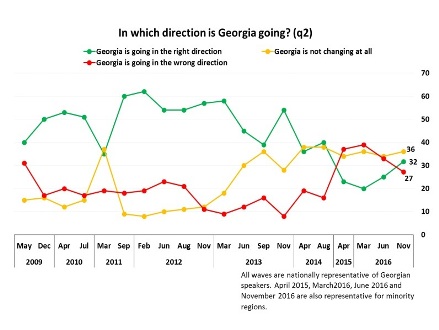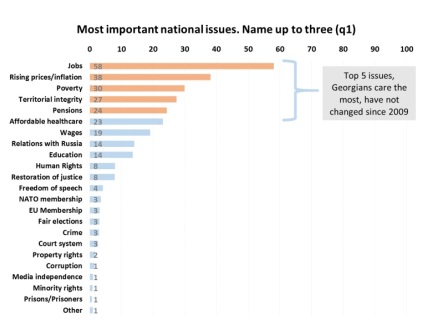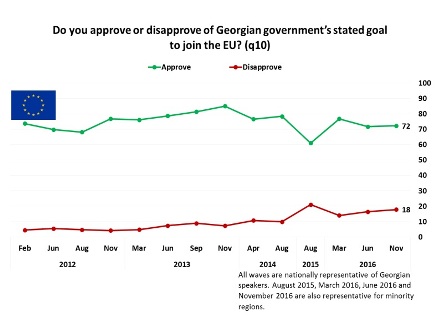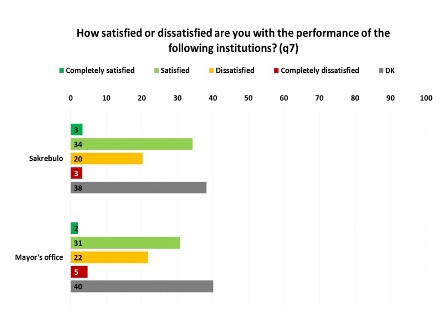
NDI-Commissioned Public Opinion Survey

Source: NDI/CRRC public opinion survey, November, 2016.
U.S. National Democratic Institute (NDI) released its commissioned public opinion survey, which shows respondents’ attitudes towards broad range of issues, among them foreign policy and local self-governance.
Number of respondents who think that Georgia is going in the “wrong direction” has declined to 27%, compared to 33% in June 2016, 39% in March 2016, 45% in November 2015, and 37% in April 2015.
32% of respondents think that Georgia is moving in the “right direction”, up from 25% in June. 36% think that Georgia is “not changing at all” (34% in June).
The survey was fielded by the Caucasus Resource Research Centers (CRRC) for NDI following the October parliamentary elections between November 4 and December 4 and was funded by Swedish International Development Cooperation Agency (Sida). The survey was conducted through nationwide face-to-face interviews (excluding occupied territories) with 3,141 respondents and has a margin of error plus, minus 1.8%.
56% of respondents said that the state of their household is the same compared to the October 2012. Only 17% described their household situation as “better off”, and the number of those who think that they are “worse off” is at 26%.
33% of respondents think that their household situation will improve for the next twelve months; 12% expects worsening and 38% thinks that it will stay the same compared to 44% in June. 26% had positive and 10% negative expectations in June, 2016.

Source: NDI/CRRC public opinion survey, November, 2016.
The poll shows that respondents perceive jobs (58%), inflation (38%), poverty (30%), territorial integrity (27%) and pensions (24%) as the most pressing issues; these five priority issues have not changed over the past years and were represented in various sequences in all previous polls.
Foreign Policy

Source: NDI/CRRC public opinion survey, November, 2016.
Number of respondents, who support the government’s stated goal to join the European Union, remained statistically same as in June (72%), down from 77% in March.
The support for the European Union is high across the country with the only exception of settlements with predominantly ethnic minority populations – 47% (in June 50%).
61% of respondents said they approve the government’s stated goal to join NATO, a seven percentage point decline compared to June 2016. 25% are against joining NATO.
Support for NATO membership declines from 47% in June to 39% in November among respondents in the settlements with predominantly ethnic minority populations.
On the question of Georgia’s foreign policy, 54% (48% – in June; 52% – in March) chose the answer: “pro-Western, however, we should maintain good relations with Russia”.
On the same question, 18% (20% – in June; 16% – in March) responded: “pro-Russian, however, we should maintain good relations with EU and NATO”.
12% respondents, statistically the same as in June, chose the answer: “pro-Western,” and 9% – “pro-Russian”, a three percentage point increase from June.
According to the poll, 53% of respondents believe that Georgia will benefit more from European and Euro-Atlantic integration; 31% think that they will benefit more if the country rejects Euro-Atlantic integration in exchange for better relations with Russia.
Local Self-Government

Source: NDI/CRRC public opinion survey, November, 2016.
About a year before October 2017 Municipal Elections, 49% of respondents think that municipal organs of government carry out important changes and 46% think otherwise. The ruling Georgian Dream – Democratic Georgia controls local self-government bodies throughout the country.
37% of respondents said that they are satisfied or completely satisfied with the work of Sakrebulo (local self-government assembly); 23% are dissatisfied or completed dissatisfied, while 38% have no answer.
33% are satisfied or completely satisfied with the work of the Mayor’s Office; 27% are dissatisfied or completely dissatisfied and 40% “do not know.”
33% of interviewed Tbilisi residents are satisfied with the work of the Mayor’s Office; 34% are dissatisfied and 33% do not have an established position. 39% of respondents are dissatisfied and 36% are satisfied with the work of the Kutaisi Mayor’s Office. Number of respondents, who are satisfied with the work of Batumi, Zugdidi and Akhaltsikhe mayor’s office prevails over those, who are not satisfied, but the number of respondents, who do have a clear position, is high here as well.
NDI plans to publish part of the public opinion poll involving political rankings on Wednesday.
This post is also available in: ქართული Русский